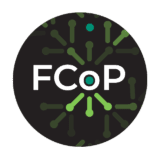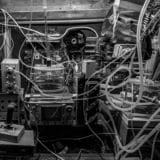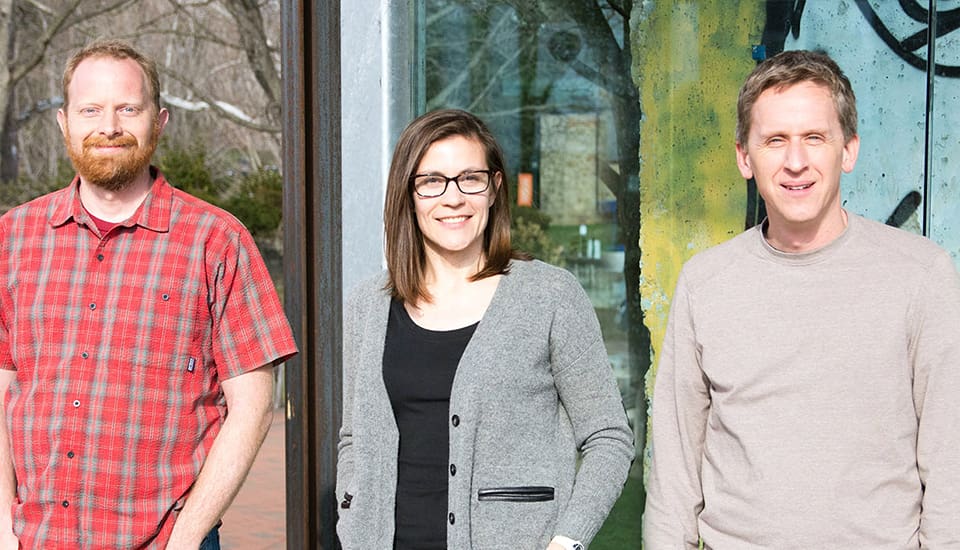Overview
The Library at the University of Virginia in Charlottesville provides access to accumulated knowledge and advances learning by collecting, preserving, organizing, and sharing materials of all kinds. The Emulation in the Archives project aimed to build, test, and develop workflows related to preservation and emulation in Library collections.
The FCoP cohort project worked to document and openly share reproducible technical and administrative workflows that result from the processing, preservation, emulation and access to software and digital materials in the Peter Sheeran papers — a collection from a local Charlottesville architecture firm comprised of many software dependent items. The project also worked to share knowledge and build engagement, publicly documenting the parallel failures, roadblocks, and resourcing realities, in order to inform successful approaches within the preservation community in the future.
Outcomes
The University of Virginia team produced a wealth of documentation and pedagogical materials on emulation in the archives throughout the project duration. Their focus was on developing institutional capacity to acquire, preserve, and provide access to software and born-digital materials, and their lightweight “just in time” approach provides a useful model for other institutions with passionate staff but constrained resources.
The team also led a free day-long workshop on software preservation and emulation of born digital materials, which helped develop knowledge and shared learning at the University of Virginia and beyond. This commitment to sharing insights and tools with the UVA community, as well as at the Society of American Archivists and International Digital Curation Conferences, helped develop the conversation around emulation and preservation.

Fostering a Community of Practice at the University of Virginia Library: Final Report
This report summarizes the University of Virginia FCoP project, its outcomes and community building activities, and a set of next steps.
FCoP, Reports, Resources
Insights
- Start from the ideal vision for access and then work backwards to determine the needs to support it, strengthen infrastructure for born-digital materials including software, and support training for new approaches.
- Software preservation and access is often a hybrid process: it requires preserving the software or object of study itself, and also the operating systems, software, or hardware that is needed to use and run that software.
- Institutional limitations may mean that a lightweight, “just in time” approach to software curation, description, and preservation is most effective.
- Assessing your whole software preservation workflow, starting from what happens before a collection is acquired, helps to figure out intervention points where data can be collected, and prepare for an effective preservation workflow.
- Consider a tool like a “software questionnaire for archives” can be useful to address the legal, technical, administrative, and collection questions that might arise when considering the acquisition of born-digital material dependent on software, or the acquisition of that software itself as an object of archival interest.
- Education and training around new workflows or documentation are essential to the work of preservation and archiving, along with buy-in and support from Administration.
Reflections

FCoP 2020 Cohort Reflections: University of Virginia
The University of Virginia Library was interested in the Fostering a Community of Practice grant from the Software Preservation Network as a way to further develop and test our born digital archiving and preservation workflows for software and software-dependent digital …Continue FCoP 2020 Cohort Reflections: University of Virginia
Cohort Reflections, FCoP, News
Workflows

University of Virginia: EaaSI Metadata Model V5
This spreadsheet lists out the types and categories of metadata collected by UVA about different kinds of digital and software object, for use with EaaSI. The spreadsheet includes an individual tab for each category object, from software product to device …Continue University of Virginia: EaaSI Metadata Model V5
FCoP, Resources, Workflow Documentation

University of Virginia: Archival Description Strategies for Emulated Software_V1.0
This document is intended to specifically address description strategies related to born digital content dependent on software for access in the Sheeran Architects Records, as well as the description of the software itself.
FCoP, Resources, Workflow Documentation

University of Virginia: Digital Donor Checklist_V0.4
This questionnaire and check list is designed to help collect information from donors about collections that are being acquired, especially when the collections contain born digital or software objects.
FCoP, Resources, Workflow Documentation

University of Virginia: Systems and Metadata Diagram
This diagram shows the relationships between different systems and repositories in UVA’s systems and metadata workflow.
FCoP, Resources, Workflow Documentation

University of Virginia: Software Questionnaire V1.0
This questionnaire document is designed to help gather information from donors and others about the context and content of work. It is meant for collections that have been flagged as potentially having software or software dependent material in need of …Continue University of Virginia: Software Questionnaire V1.0
FCoP, Resources, Workflow Documentation
Conferences & Presentations
Emulation in the Archives (EitA) Workshop website
Website listing the conference schedule, speaker information, and more for the Emulation in the Archives (EitA) workshop held at the University of Virginia on July 18, 2019.
Link: https://workshop.lib.virginia.edu/emulation_in_the_archives/index.html
“Introduction to Software Preservation and Emulation” Presentation Slide Deck (EitA)
By: Lauren Work
Link: https://osf.io/pj4ba/
Slide deck for the introduction to software preservation and emulation, presented at the Emulation in the Archives workshop held at the University of Virginia on July 18, 2019.
“Metadata and Descriptive Software” Presentation Slide Deck (EitA)
By: Jeremy Bartczak and Elizabeth Wilkinson
Link: https://osf.io/49823/
Slide deck for a talk providing an introduction to metadata and descriptive software, presented at the Emulation in the Archives workshop held at the University of Virginia on July 18, 2019.
“Curatorial Workflows” Presentation Slide Deck (EitA)
By: Lauren Work and Elizabeth Wilkinson
Link: https://osf.io/82h34/
Slide deck for a talk discussing curatorial workflows, presented at the Emulation in the Archives workshop held at the University of Virginia on July 18, 2019.
“Access and Use” Presentation Slide Deck (EitA)
By: Lauren Work and Elizabeth Wilkinson
Link: https://osf.io/sk895/
Slide deck for a talk about access and use of emulated software, presented at the Emulation in the Archives workshop held at the University of Virginia on July 18, 2019.
Technical Overview Presentation Slide Deck (EitA)
By: Mike Durbin
Link: https://osf.io/xb7tm/
Slide deck for a talk providing technical overview to software emulation, presented at the Emulation in the Archives workshop held at the University of Virginia on July 18, 2019.
“Making Copyright and Fair Use Work in the Software Archive” Presentation Slide Deck (EitA)
By: Brandon Butler
Link: https://osf.io/z5fnp/
Slide deck for a talk by featured speaker Brandon Butler, presented at the Emulation in the Archives workshop held at the University of Virginia on July 18, 2019.
“Description and Preservation of Video Games” Presentation Slide Deck (EitA)
By: Laura Drake Davis and David Gibson
Link: https://osf.io/9w7uf/
Slide deck for a talk by featured speakers Laura Drake Davis and David Gibson, presented at the Emulation in the Archives workshop held at the University of Virginia on July 18, 2019.
“Researcher Access: Emulation in the Archive” Presentation Slide Deck (EitA)
By: Julia Kim
Link: https://osf.io/awtc9/
Slide deck for a talk by featured speaker Julia Kim, presented at the Emulation in the Archives workshop held at the University of Virginia on July 18, 2019.
Emulation in the Archives Workshop Shared Notes
Link: https://osf.io/fbz3t/
Shared notes collected during the Emulation in the Archives workshop, held at the University of Virginia on July 18, 2019.

University of Virginia: SAA 2019 Multithreading Software Preservation and Emulation Workshop Notes
Shared meeting notes from a workshop on Multithreading Software Preservation and Emulation presented at the 2019 Society of American Archivists conference.
Conferences & Presentations, FCoP, Resources

University of Virginia: SAA 2019 Presentation Slide Deck Slide Deck
Slide deck from a collaborative presentation (with University of Illinois) presented at the 2019 Society of American Archivists conference.
Conferences & Presentations, FCoP, Resources

University of Virginia: World Digital Preservation Day 2019 Presentation Slide Deck
Slide deck for a talk about software preservation, presented by the UVA team at the World Digital Preservation Day events held at the University of Virginia in November 2019.
Conferences & Presentations, FCoP, Resources
All-Cohort Exercises

University of Virginia: Scenarios for Use and Access
This completed worksheet describes the University of Virginia’s scope and outcomes for their Collections and Software Inventory. Information gathered during this exercise includes: Data sources referenced or searched to complete the inventory Difficulties encountered while attempting to locate software that …Continue University of Virginia: Scenarios for Use and Access
